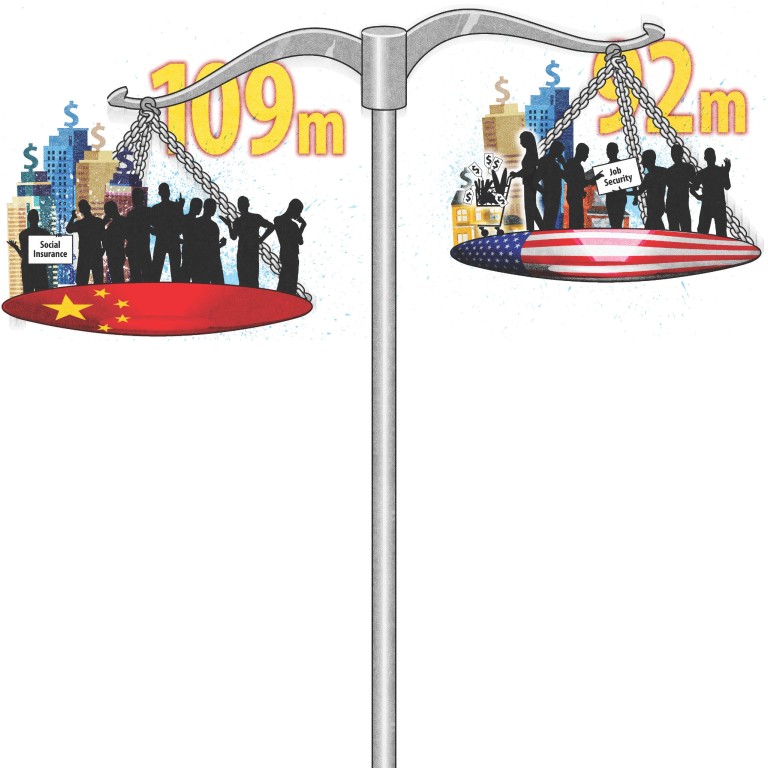
China's middle class: Beating out the US to be the largest in the world for the first time, but still not secure
On the mainland, a white-collar worker copes with losing her home in a recent disaster as basic expenses eat up her entire monthly salary
Until a few months ago, Meng Fanjie considered herself among China's rising middle class. A Tianjin-based white-collar professional, she earns more than 10,000 yuan (HK$12,000) a month, travels frequently for leisure and has some savings.
Until August, Meng lived in a leased flat into which she had poured over 100,000 yuan to transform it from bare concrete walls into a chic and cosy home.
But things changed on August 12, when a series of explosions at a chemicals warehouse less than 1km from her home rocked the city, killing at least 165 people and damaging the homes of more than 17,000 households nearby, including Meng's.
Since then, she has been staying in a hotel as she waits for her landlord - who received the government compensation for the disaster - to pay for her losses.
"It's a great loss to me … I'm homeless now," she said, adding that there was now a lack of flats available for rent as many people had lost their homes after the blasts. "Whatever they call me - office lady or middle class - I'm incapable of withstanding such disasters."
The mainland's middle class, with an estimated 109 million people, is now the world's largest, according to a Credit Suisse report. It defined a mainland middle class adult as one with wealth of at least US$28,000.
Read more: US' middle class: Making ends meet on a single income in one of America's most expensive cities
The United States has the second-largest middle class with some 92 million people, the report said, defining the American middle class adult as possessing wealth of between US$50,000 and US$500,000.
"Chinese people's spending power is growing. The middle class is expanding - and fast - but they are also facing very big risks," said professor Yang Yansui of Tsinghua University.
One major problem was that employees were subjected to high taxes and social insurance schemes with low returns, Yang said. For instance, from the start of their careers, young people are required to contribute 8 per cent of their salaries into their pensions, compared with a tiered system in Western countries. This meant that a worker's money was being used by someone else while he was still far off from realising a return, she said.
Another problem was the unequal distribution of education resources, which forced many parents to splash out on things like buying homes near good schools to secure better access to education for their children.
A third - and most important - problem was buying a home, which "held to ransom many well-educated young professionals with a decent income", Yang said. "Together, these factors make it difficult for the Chinese middle class to develop."
Meng said she could have bought a home but chose not to as it was "not worthwhile" to buy one and live with a mortgage.
"In the US, you buy a home and you own both the land and the things attached to it. But here, we own only the latter - and only for 70 years," she said.
As families in megacities such as Beijing and Shanghai struggle to afford their own property - with mortgages taking up more than half of the family income for many - people often joke that they are afraid to fall ill or meet with an accident as the expenses incurred were almost certain to leave them high and dry.
US citizens, on the other hand, were less worried about diseases and accidents because of better insurance schemes protecting them from such calamities, said professor Stephen Arbogast from the University of North Carolina at Chapel Hill.
The US middle class was most anxious about the likelihood of losing their jobs, Arbogast said.
"Companies move lots of jobs overseas. Employees … can become 'obsolete' in terms of skills or 'over-qualified' in that companies no longer feel they should pay what they cost relative to someone slightly less skilled but much cheaper," he said. "This job insecurity … has weakened the bargaining power of employees and unions, leading to stagnant wages and incomes."
Now I'm spending all my salary on basic needs, the hotel, transport and meals … I don't have any money left for travel or entertainment
Shanghai University sociology professor Gu Jun believes it is too early to conclude that China's middle class is rising.
"I don't think there are a lot of people in China who are living lives as decent as the American middle class," Gu said. "Defining so many people as middle class [as in the Credit Suisse report] is like putting China's feet into another country's boots."
According to the Credit Suisse report, 39 per cent of the adult population in North America falls into the middle class. In contrast, China's middle class comprises just 11 per cent of the country's total adult population.
For Meng, she is more concerned about the compensation for her damaged home than about which class she belongs to in society. The compensation, which she estimates should come up to about 300,000 yuan, would mean a large chunk of savings for her, she said.
Losing her home in the blasts had altered her spending habits, Meng said. "Now I'm spending all my salary on basic needs, the hotel, transport and meals … I don't have any money left for travel or entertainment."

